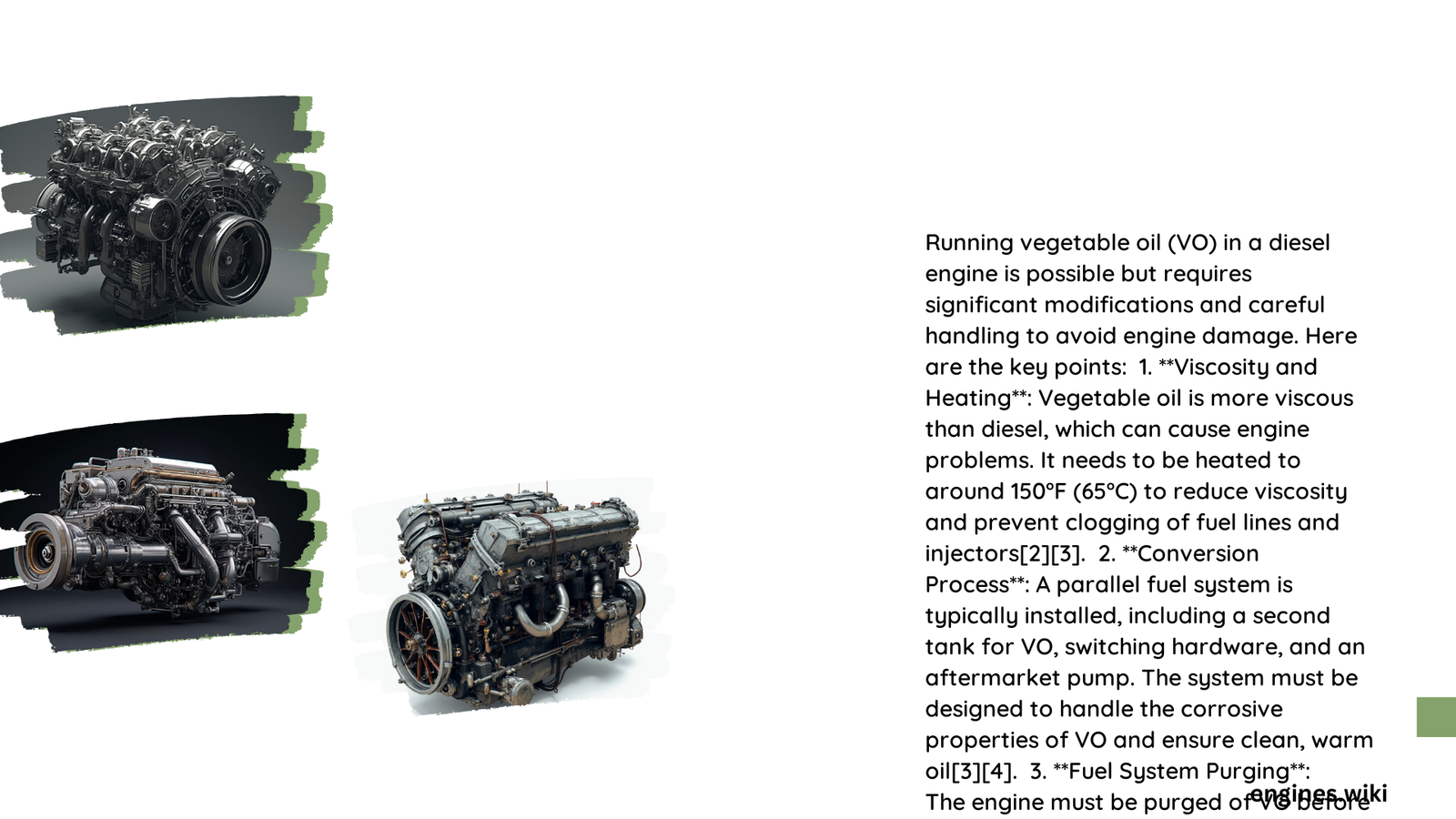Running vegetable oil in a diesel engine is possible but requires specific modifications and considerations. While it can offer environmental and cost benefits, it also comes with potential risks and challenges. This article explores the feasibility, requirements, benefits, and risks of using vegetable oil as a fuel in diesel engines, providing a comprehensive overview for those considering this alternative fuel option.
What Are the Specific Requirements for Running Vegetable Oil in a Diesel Engine?
To successfully run vegetable oil in a diesel engine, several key modifications and requirements must be met:
-
Engine Compatibility: Not all diesel engines are suitable for vegetable oil conversion. The most compatible engines are those with in-line or distributor pumps from manufacturers like Bosch, Diesel-Kiki, Nippon-Denso, or Zexel. Engines with high-pressure injection systems often require specialized solutions.
-
Filtration System: A robust multi-stage filtration system is crucial to prevent contaminants from clogging the fuel system. This typically includes:
- 100-micron filter
- 10-micron filter
-
1-micron filter
-
Heating Mechanism: Vegetable oil must be heated to reduce its viscosity for proper combustion. This is usually achieved by:
- Using the engine’s coolant system
- Heating the oil to approximately 175°F (79°C)
-
Running coolant lines along vegetable oil fuel lines and through the vegetable oil tank
-
Two-Tank System: A common setup includes:
- One tank for diesel fuel (starting and stopping)
- One tank for vegetable oil
- Fuel selector switch
- Additional fuel lines
- Preheating system integrated into the cooling water circuit
What Are the Quantified Benefits of Using Vegetable Oil in Diesel Engines?

Using vegetable oil as a fuel in diesel engines can offer several benefits:
- Fuel Efficiency:
- Similar efficiency to conventional diesel fuel
-
No significant reduction in engine power or fuel consumption
-
Emissions Reductions:
- CO2-neutral
- Sulfur-free
- Non-toxic
-
Potential reduction in greenhouse gas emissions (exact figures not provided in sources)
-
Cost Savings:
- Can be more economical than conventional diesel fuel
- Used cooking oils (WVO) can be significantly cheaper
- Exact savings per gallon vary depending on source and cost of vegetable oil
What Are the Documented Risks of Using Vegetable Oil in Diesel Engines?
While there are benefits, using vegetable oil in diesel engines also comes with potential risks:
- Engine Wear and Clogging:
- Reduced engine life due to carbon deposit buildup
- Accumulation of straight vegetable oil (SVO) in engine lubricant
-
Long-term engine deposits and clogging issues, even at low concentrations
-
Warranty Implications:
- Conversion may void manufacturer’s warranty
-
Potential loss of coverage for engine-related issues
-
Long-Term Performance Issues:
- Increased engine maintenance costs
- Shorter engine life
- Operational and durability problems in long-term use
What Are the Precise Compatibility Factors for Vegetable Oil as a Fuel?
Understanding the compatibility factors is crucial for successfully using vegetable oil as a fuel:
- Viscosity:
- Vegetable oils are significantly more viscous than diesel fuel
-
Requires heating to reduce viscosity before combustion
-
Blending Ratios:
- Blending with diesel can mitigate some issues
-
Even low blending ratios (e.g., 1% SVO) can cause long-term engine deposits and wear
-
Temperature Thresholds:
- Optimal performance achieved at around 175°F (79°C)
- Starting on diesel and switching to vegetable oil once the engine is warm is recommended
How Does the Conversion Process Work?
The conversion process typically involves the following steps:
-
Engine Assessment: Determine if your diesel engine is suitable for conversion.
-
Installation of Two-Tank System:
- Install a separate tank for vegetable oil
-
Add fuel lines and a selector switch
-
Heating System Setup:
- Install a heating mechanism using engine coolant
-
Integrate preheating system into cooling water circuit
-
Filtration System Installation:
-
Add multi-stage filtration system (100, 10, and 1 micron filters)
-
Control System Integration:
-
Install a control system to manage fuel switching and heating
-
Testing and Calibration:
- Run the engine on diesel initially
- Switch to vegetable oil once operating temperature is reached
- Monitor performance and make necessary adjustments
What Are the Legal and Warranty Considerations?
Before converting your diesel engine to run on vegetable oil, consider the following:
- Warranty Implications:
- Conversion may void manufacturer’s warranty
-
Check with your vehicle manufacturer or dealer
-
Legal Considerations:
- Regulations vary by region
- Some areas may require emissions testing or certification
-
Check local laws regarding the use of alternative fuels
-
Insurance Implications:
- Inform your insurance provider about the conversion
- Ensure coverage is not affected
Conclusion: Is Running Vegetable Oil in a Diesel Engine Viable?
Running vegetable oil in a diesel engine is technically possible but requires careful consideration:
- Pros:
- Potential cost savings
- Environmental benefits
-
Renewable fuel source
-
Cons:
- Requires significant modifications
- Potential for increased engine wear
- May void warranty
- Legal and regulatory considerations
Ultimately, the decision to run vegetable oil in a diesel engine depends on individual circumstances, including the type of engine, local regulations, and willingness to manage the additional maintenance and potential risks involved.
